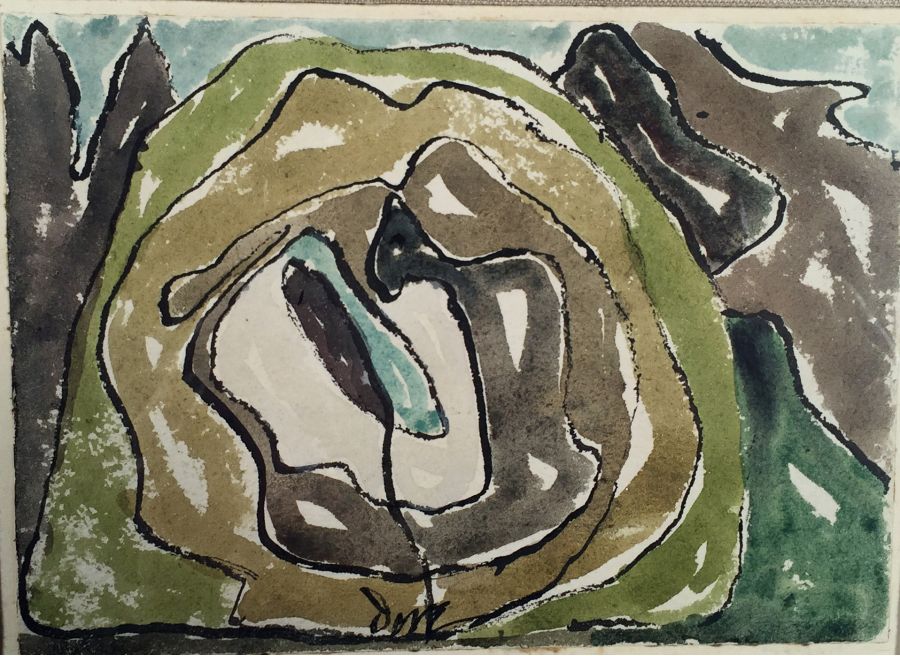Dove, Arthur (American, 1880-1946).
CENTERPORT SERIES #23. Watercolor on paper, 1940. Signed "Dove," at the lower center.
Labels identifying the work on the backing paper of the frame, verso, from The Downtown Gallery, Terry Dintenfass, Inc, where the work was offered for sale, and from the Wadsworth Atheneum and the Fort Worth Art Center, where it was exhibited. Other provenance: The Alpha Gallery, Boston, MA, and a private New England collection.
The painting fills the entire 5 x 7 inch sheet, which is mounted to a larger sheet. In excellent condition, with the colors very fresh.
Framed.
In 1938, Arthur Dove and his wife, the painter Helen Torr moved from Geneva, NY to Centerport, NY where, for $980.00, they purchased a small building which had formerly been a post office. Dove's work evolved during the eight years he had remaining to him before his death in 1946 so that it became more lyrical, what he described as "a sequence of formations" similar to musical harmonies. The work he did at Centerport is considered among his most disctinctive. In a letter to Duncan Phillips written shortly before Dove's death, thanking him for providing financial support, Dove mentions having shown some of the Canterport paintings which he thought "had something new in them,"to Alfred Stieglitz, who, he says, immediately and intuitively understood the new ideas in them. Helen Torr stopped painting after Dove's death, and continued to live in the Centerport Cottage until her death in 1967.
The Dove/Torr Cottage is now on the National Register of Historic Places. It is a sad commentary on the lives of artists that even with the recognition and support of such leading artworld figures as Stieglitz and Phillips, Dove could not support himself as an artist, and that Torr's work, fifty years after her death is only just now receiving some recognition.
CENTERPORT SERIES #23. Watercolor on paper, 1940. Signed "Dove," at the lower center.
Labels identifying the work on the backing paper of the frame, verso, from The Downtown Gallery, Terry Dintenfass, Inc, where the work was offered for sale, and from the Wadsworth Atheneum and the Fort Worth Art Center, where it was exhibited. Other provenance: The Alpha Gallery, Boston, MA, and a private New England collection.
The painting fills the entire 5 x 7 inch sheet, which is mounted to a larger sheet. In excellent condition, with the colors very fresh.
Framed.
In 1938, Arthur Dove and his wife, the painter Helen Torr moved from Geneva, NY to Centerport, NY where, for $980.00, they purchased a small building which had formerly been a post office. Dove's work evolved during the eight years he had remaining to him before his death in 1946 so that it became more lyrical, what he described as "a sequence of formations" similar to musical harmonies. The work he did at Centerport is considered among his most disctinctive. In a letter to Duncan Phillips written shortly before Dove's death, thanking him for providing financial support, Dove mentions having shown some of the Canterport paintings which he thought "had something new in them,"to Alfred Stieglitz, who, he says, immediately and intuitively understood the new ideas in them. Helen Torr stopped painting after Dove's death, and continued to live in the Centerport Cottage until her death in 1967.
The Dove/Torr Cottage is now on the National Register of Historic Places. It is a sad commentary on the lives of artists that even with the recognition and support of such leading artworld figures as Stieglitz and Phillips, Dove could not support himself as an artist, and that Torr's work, fifty years after her death is only just now receiving some recognition.



